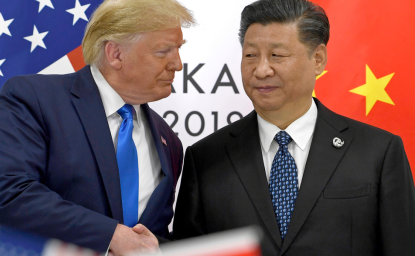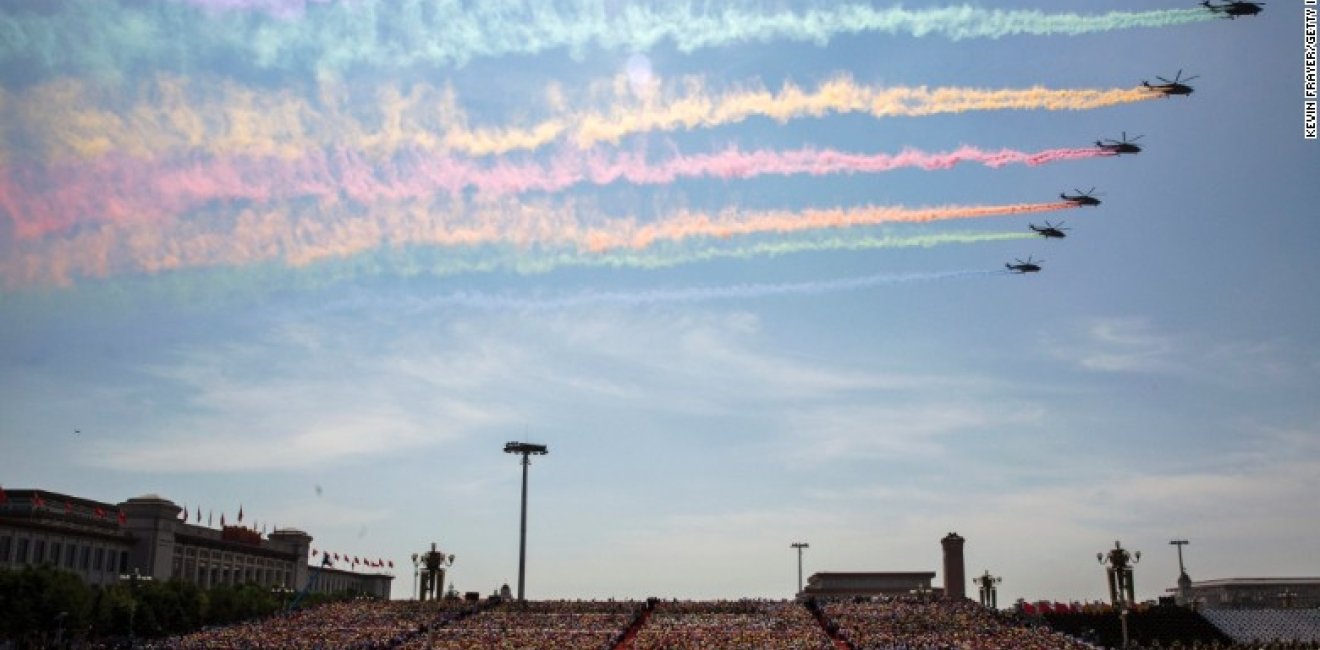In the confrontational atmosphere pitting Beijing against Washington and its allies in Asia, it is often forgotten that China and much of the west were allies in the region’s defining wartime struggle, fighting their then mutual foe, Japan.
In September, Beijing is planning a massive military parade to remind the west and the rest of the world of that moment, the 70th anniversary of Japan’s surrender in the Pacific War. As commemorations go, it promises to be an awkward occasion.
Vladimir Putin, of course, plans to attend, returning the favour of Xi Jinping’s presence at the Russian commemoration earlier this year of the allies’ defeat of the Nazis. Mr Putin’s presence will not come as a surprise, given his geopolitical bromance with Mr Xi.
But China is after a bigger prize – the country’s top diplomats have made it clear they want to see western leaders standing on the podium alongside the likes of Mr Putin to mark victory in the ‘War of Resistance against Japanese Aggression’.
Wang Yi, China’s foreign minister, spent much of a recent dinner with European envoys in Beijing pressing them to send their countries’ leaders to the event.
Other western countries, like the US, the UK and Australia, have not only been invited. Chinese diplomats have suggested they send serving members of their military to join the march.
There is little chance, however, that any of these countries will send their leaders to the event, let alone allow serving military personnel to march. Lower-level officials may attend in their place.
The issue is not that China is commemorating the defeat of Japan. After all, western nations have long marked their victory in the second world war. Why not China, which suffered most at the hands of the Japanese and endured millions of civilian and military casualties in a decade-plus conflict?
Nor is it simply crude geopolitics, western diplomats insist, and the fact that Japan now has its feet, as it did in the first world war, once again firmly planted in the western camp.
The countries being lobbied by Beijing, however, have taken issue with the scale and intensity of Beijing’s plans, which they see as part of a broader campaign to ensure that Japan remains, in the words of one Chinese academic, “an historical criminal”.
In a country in which political speech is intensely policed, Japan has long been one of the few topics that people, including writers and filmmakers, could vent about in China without restraint. But even the ruling Chinese Communist party is worried that Japan-bashing has gone too far.
The party’s propaganda department recently pulled off the air an anti-Japanese drama, ‘Fighting Together Against the Devils’, because it was full of sexual innuendo, local media said.
“We have seen ‘a Chinese soldier slicing a Japanese solider into half using his bare hands’ and ‘a Chinese battalion commander throwing a grenade into the air to down a Japanese airplane’, which can only be described as ridiculous,” said Wu Yixue, a China Daily columnist.
“Such exaggerations – with the icing on the cake being ‘my grandpa was killed by the Japanese at the age of 9’ – undermine the achievements and sacrifices of the Chinese people.”
Chinese academics who follow Japan say that most of the commemorations do not contain the over-the-top tone of these vengeful wartime soap operas. However the event is pitched, in any case, China’s growing power and reach will ensure it is the largest commemoration ever of the defeat of Japan.
There is one aspect of about the anti-Japanese war which is unlikely to be aired, and that is historical controversy over the role of the CCP in defeating Japan. Put another way – is the party commemorating victory in a war it didn’t win?
Stanford academic Andrew Walder in his recent book ‘China Under Mao’ estimates that the Communists suffered only about one in ten of the casualties in the war, with the bulk of the fighting carried by the CCP’s then civil war rival, Chiang Kai-shek’s Nationalists.
The notion that Mao’s doctrine of the “people’s war” won the day is a myth. “The people’s war was hardly used in the conflict against the Japanese,” says Walder.
The Chinese commemoration will be preceded by Japan’s own annual ceremony in early August to mark the dropping of atomic bombs on Hiroshima and Nagasaki. Japan’s prime minister, Shinzo Abe, will making a speech on August 15 – the anniversary of Emperor Hirohito’s broadcast which ended Japanese resistance to allied troops advancing on Japan.
The Chinese have chosen September 3, the day after the anniversary of the formal surrender on the USS Missouri.
This article was originally published by FT.com.
中国的“阅兵外交”
(译者/何黎. 原文刊登在 FT中文网.)
在中国与美国及其亚洲盟友之间的对抗气氛下,人们往往会忘记,在亚洲具有决定意义的战争中,中国和西方很多国家都曾是盟友,打击他们共同的敌人——日本。
今年9月,中国计划举行大规模阅兵式,以提醒西方以及全球其他国家铭记日本在太平洋战争中战败70周年。与所有纪念活动一样,预计这也将是令人尴尬的一次。
当然,俄罗斯总统弗拉基米尔•普京(Vladimir Putin)计划出席阅兵式,这是为了答谢习近平在今年早些时候出席俄罗斯为纪念盟军战胜纳粹而举行的纪念活动。鉴于普京与习近平在地缘政治方面的亲密关系,普京的出席不会令人意外。
但中国希望把场面做大。中国最高外交官已明确表示,希望看到西方领导人与普京等人一同站在检阅台上,纪念抗日战争胜利。
在最近的一次宴会上,中国外交部长王毅用很长时间与欧洲驻京大使交谈,敦促他们让本国领导人参加此次阅兵式。
与美国、英国和澳大利亚一样,其他西方国家不仅是受到了邀请,中国外交官员还建议他们派遣现役军人参加阅兵。
然而,这些国家几乎都不可能派出领导人参加,更别提让现役军人参加了。级别较低的官员可能会代表他们参加。
问题不在于中国纪念抗日战争胜利。毕竟,长期以来,西方国家一直在纪念二战反法西斯胜利。为什么遭受日本最惨痛蹂躏、并在十多年抗战中有成百上千万平民和军人丧生的中国不可以纪念呢?
西方外交人士坚称,问题也并非简单的地缘政治,或者是因为日本现在像在一战时那样再一次稳稳踏入西方阵营。
然而,中国正在游说的国家对中国纪念活动的规模和强度提出异议,他们认为这些活动是更广泛计划的一部分,用一位中国学者的话来说,这个计划就是要确保日本仍然是“历史罪人”。
长期以来,在这个政治言论被严密管制的国家,日本一直是人们(包括作家和电影制作人)为数不多的可以毫无顾忌地发泄怒气的主题之一。然而即便是执政的中国共产党也担心对日本的鞭笞有些过火。
中国当地媒体表示,共产党宣传部门最近叫停抗日电视剧《一起打鬼子》的播放,因为里面充斥着性暗示。
《中国日报》(China Daily)专栏作家吴义学写道:“我们看到‘中国士兵手撕鬼子’以及‘一位中国营长朝空中扔出一颗手榴弹击落一架日本飞机’,这些只能用荒谬来形容。”
“更有甚者有台词说‘我爷爷9岁就被日本人杀害了’,这些夸张表演损害了中国人民的功绩与牺牲。”
研究日本的中国学者表示,多数纪念活动不包含这些有复仇心理的抗战电视剧的夸张论调。无论如何,不管如何宣传此次阅兵,中国与日俱增的实力以及影响力将确保这是规模最大的一次纪念抗日战争胜利的活动。
关于抗日战争有一点不太可能播出,那就是围绕中国共产党在抗日战争中作用的历史争议。换句话说,共产党是否在纪念一场不是由他们取得的战争胜利?
斯坦福大学(Stanford)学者安德鲁•瓦尔德(Andrew Walder)在最近一部著作《毛泽东领导下的中国》(China Under Mao)中估计,抗日战争中伤亡的大约只有十分之一是共产党,进行大部分战斗的是共产党在内战时期的对手——蒋介石领导的国民党。
认为是毛泽东“人民战争”理论赢得了这场胜利的观点是站不住脚的。瓦尔德表示:“人民战争几乎没有用在抗日战争上。”
在中国举行阅兵式之前,日本将在8月初举行一年一度的仪式,纪念广岛和长崎原子弹爆炸。日本首相安倍晋三(Shinzo Abe)将在8月15日发表演讲——1945年的同一天,日本天皇裕仁通过广播发表讲话,结束了日本对进攻日本的盟军的反抗。
中国选择9月3日、日本在密苏里号(USS Missouri)正式投降之后一天作为抗日战争胜利纪念日。
Author
Former Beijing and Washington Bureau Chief, Financial Times

Kissinger Institute on China and the United States
The Kissinger Institute works to ensure that China policy serves American long-term interests and is founded in understanding of historical and cultural factors in bilateral relations and in accurate assessment of the aspirations of China’s government and people. Read more

Explore More
Browse Insights & Analysis
China Strikes Back Against US Tariffs, But Leaves Room for Negotiations



